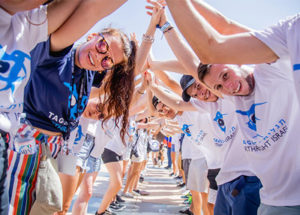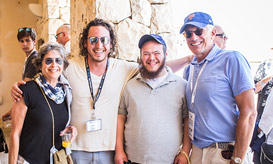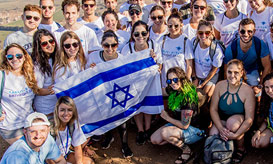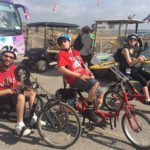My No Limits Birthright Israel trip was one of the greatest experiences of my life! A…
Disability rights advocate Brandon Farbstein had just finished a tour of Jerusalem’s Old City when he rolled up to the Holyland Café on his Segway, a trusted mobility aid, on a warm Sunday afternoon earlier this month. He was in Israel for the first time as part of an outdoor-focused Birthright trip, which takes participants to explore the country on ATV and whitewater rafting tours.
“We’re really getting immersed in the culture, in the people, in the energy,” Farbstein told The Times of Israel. “That’s something that I know I will never forget. It’s one thing to visit a place, it’s another thing to really feel like you are one of the locals.”
Although he enjoyed his stay, Farbstein maintains that “there is much room for improvement when it comes to how Israel sees people with disabilities.”
Following his break at the cafe, Farbstein visited the Western Wall, a central experience of any Birthright program. While he was able to find a ramp that led him to the revered site and avoided a number of stairs, it was still a challenge navigating the cobblestones and crowded streets of the Old City.
“After thousands and thousands of years, you’re not really able to do a whole lot of renovations to make it accessible,” Farbstein said, noting the difficulties that would come with improving accessibility in the Old City.
“However, in a city like Tel Aviv that’s recent and modern and has everyone in mind, you can really tell it is an open place for people with disabilities. There are ramps and there aren’t steps everywhere… Sometimes it’s the small things that make a profound difference in literally being able to get into a place to begin with,” he said.
At the age of two, Farbstein was diagnosed with an exceedingly rare form of dwarfism called metatropic dysplasia. To date, there are only 81 reported cases of his condition in medical history.
“I’ve been incredibly blessed all my life that the only issues I’ve ever dealt with are in my joints,” Farbstein said. “With my condition, if you’re born with a more severe form of it, you usually pass away before the age of five.”
Now 23, Farbstein rose to prominence as a public speaker in his teenage years and has since published multiple books about self-love rooted in his own struggles with cyberbullying related to his short stature.
Although he endured teasing and some targeted harassment in elementary and middle school, it was his high school experience that was unbearable. In his very first week, harassment turned into death threats. Not knowing who was behind any of these attacks, the perpetual fear became too much to bear. Farbstein dropped out midway through his junior year, continuing his studies online.
“We felt like we were on a deserted island. There was no support from the police, there was no support from the school system,” he said.
At the same time, Farbstein was discovering his voice through public speaking events, starting with the TedX talk he gave at just 15 years old. Although his fledgling public speaking career began to take shape, it didn’t lessen the bullying he experienced at school.
In 2017, he spoke at Charlottesville’s Rotary Club in the wake of the white supremacist rally that shook the city just a month before. It was the first time Farbstein had seen “antisemitic hate show up in such a profound way” in the US, and he was disturbed by the proximity of the rally to his hometown of Richmond, Virginia.
Simple Steps Toward Disability Inclusion
Farbstein believes that society still has a long way to go in disability inclusion.
“Needing to prove to people that you deserve space is really draining, and I feel like it is a totally different beast than any other form of advocacy,” he said.
Birthright Israel CEO Gidi Mark was overjoyed to hear that the advocate was participating in the program.
“Brandon inspires millions of people around the globe every day… Brandon can also raise awareness among young Jews with disabilities that they can come on a Birthright Israel trip and have the time of their lives like any other participant,” he said.
After the 10-day trip, Farbstein is determined to return to Israel to experience more of what the country has to offer.
“It was a spiritual reset that was so needed to find a greater version of myself. I’ve gotten the bug and I can’t wait to spend more time in the country,” Farbstein said.
“I’m very grateful that [on Birthright] I had an amazing group that was more than willing to carry my Segway whenever and wherever I needed,” he said, “because of course I’m not able to take it up and down the steps.”
Farbstein believes that Israel has the opportunity for a new wave of innovation. Building more curb cuts into sidewalks, ramps instead of stairs and larger elevators to serve those in wheelchairs are among the initiatives he would like to see Israeli authorities undertake.
Noting the lack of an entrance ramp in the hotel he stayed at earlier that week, he said, “There are elevators, but what’s the point of having an elevator if you can’t get into the hotel in the first place?”













